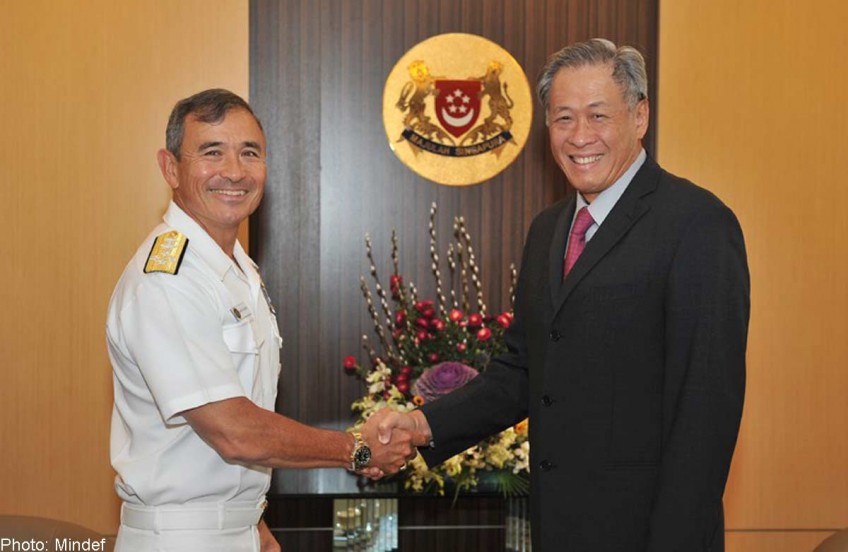Military frontman of US pivot to Asia

It has never been officially confirmed by the military, but those who know Admiral Harry Harris say that on the first day he took over as commander of the Guantanamo Bay detention camp, he asked to be force-fed.
Adm Harris, now 57, had heard that inmates at the remote island prison who went on hunger strike were subjected to such treatment.
And if that was the sort of practice he was going to oversee, he wanted to know what it felt like.
That story is now part of the folklore surrounding Adm Harris, the four-star admiral who has risen rapidly to become the highest-ranking Asian American officer in the history of the United States Navy.
The reputation of Adm Harris, whose mother is Japanese, is such that many observers in Washington hailed his nomination as head of the Pacific Command, which is responsible for defending and promoting US interests in the Pacific and Asia.
"I think he is the absolute finest that the military has to offer, and I can't think of anyone better qualified for that position," said Mr Randy Schriver, formerly US deputy assistant secretary of state for East Asian and Pacific affairs.
Mr Schriver, now with consulting firm Armitage International, added that Adm Harris was his first boss, back in 1990 when he joined the navy as an intelligence officer.
Mr Schriver said that even then, more than 20 years ago, his boss' potential was clear. He was just a lieutenant-commander at the time but, already, people were referring to him as Adm Harris.
Hawaii Senator Mazie Hirono lauded the appointment as well.
"As a member of the Senate Armed Services Committee, and with the headquarters of the US Pacific Fleet Command located in Hawaii, I've had the opportunity to develop a strong relationship with Adm Harris," she said.
" His understanding of the importance of our nation's strategic rebalance to the Pacific will be vital in his new role."
If his appointment is approved by the US Senate, Adm Harris will be the leader of all the US forces in the Pacific, taking on the post at a particularly crucial time.
He would be the frontman for the military dimensions of the US rebalance in Asia; he would need to tackle growing tensions in the South and East China seas; and he would have to oversee the potentially sensitive relocation of the Futenma Air Base in Japan.
Adm Harris is familiar with the region and has long been a firm supporter of America's "pivot" to Asia.
After having been installed as Commander of the US Pacific Fleet last year, he visited Singapore in January this year to meet US sailors stationed in the Pacific, as well as to discuss the strategic rebalance with Asian leaders.
In addition, he wrote an op-ed for The Straits Times, published on Jan 21, in which he stressed that the US and China cannot be at odds with each other.
"Part of the rebalance is defining a professional relationship with China's navy by our shared future and mutual responsibilities, and not by histories and differences," he wrote then.
"Though nations pursue diverse interests in this region, stability and decreased tension are keys to shared prosperity and peace.
All appreciate that conflict and crisis are bad for business," he added.
Adm Harris was born to an American father and a Japanese mother in Yokosuka, Kanagawa prefecture in Japan, but grew up mainly in Tennessee and Florida.
His father was a navy chief petty officer while his mother came from a privileged family in Kobe.
He graduated from the US Naval Academy in 1978 and subsequently earned postgraduate degrees at the Harvard Kennedy School and Georgetown University.
Over the course of his military career, he has received two Distinguished Service Medals, three Defence Superior Service Medals, three Legions of Merit and two Bronze Stars.
He served in both Iraq wars, as well as in the 2011 conflict in Libya when the US was aiding anti-Gaddafi forces.
Adm Harris is known for maintaining a strong connection with his Japanese heritage, and he has often spoken about it publicly.
In a 2012 interview, he recalled how his mother responded to his complaints that he did not fit in with his classmates in Tennesse, especially because he had to have the bento lunches she prepared for him.
"She went to a PTA (parent-teacher association) meeting dressed in the only thing she had brought from Japan - a full kimono, geta, obi, the whole thing. She taught me to be proud of my ethnic heritage."
He added: "I'm an American - first, foremost and always - but there will always be things my mother represented of which I am proud."
During a speech at a US Veterans Day ceremony last year, he credited his mother with teaching him a sense of duty.
He said: "While my father was from Tennessee and wore the navy uniform in World War II, my mother had a very different story.
"She's Nihonjin (Japanese), from Kobe, Japan. She lost her home, her school, many of her friends in air raids during the same war that her future husband was fighting.
"It was from her that I learnt the concept of giri - duty - which is an important part of my heritage and of who I am."

This article was first published on Oct 6, 2014.
Get a copy of The Straits Times or go to straitstimes.com for more stories.